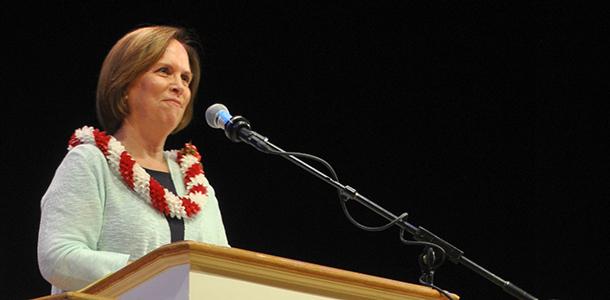Plans in place to combat deficit
President Jane Fernandes addresses the budget situation at her inauguration on August 26.
Although the College’s current budget problems are common knowledge, many do not know what President Jane Fernandes, her cabinet and the board of trustees are doing to resolve the situation.
“A college, as with any organization, goes through cycles with their finances,” said Jimmy Wilson, interim vice president of finance in an email interview with The Guilfordian. “Some years or cycles have more available resources than others. To be a sustainable organization, you must adjust your spending to match the available resources. With the recent economic environment in higher education and among the families they serve, colleges nationally are seeing greater complexities in the budget process.”
Guilford currently has over a $4.4 million deficit — last year’s $2 million, which has now been covered by a loan, plus over $2.4 million this year.
To address the budget problems, around 40 faculty and staff positions were cut by means of voluntary departures, retirements, canceled searches and layoffs. Meanwhile, stagnating salaries of faculty came to light, even while administrators’ salaries were rising. With all these conflicting complexities, the road to a balanced budget remains unclear.
Much of the budget problem stems from steadily declining student enrollment rates.
In 2009, enrollment was at an all-time high, at around 2,800 students. This year, there are 2,137 students, including traditional-age students, Center for Continuing Education students and Early College students.
The declining numbers of CCE students have been especially high. According to Fernandes and Wilson, the main culprit is the state’s discontinuing of the North Carolina Tuition Grant, which provided a stipend to North Carolina residents attending private in-state colleges.
At the federal level, changes that lessened available aid to CCE students were also made to the Federal Pell Grant program.
It is not surprising that reforming and reimagining CCE is a priority in a list of 10 major priorities that Fernandes noted in mid-June. Other priorities include increasing enrollment of traditional and adult students, strengthening the centrality of the student experience, advancing the Guilford profile and updating facilities such as residence halls and student lounges.
Fernandes also created two new vice president positions back in March: a marketing position and an enrollment management position. These new spots were created to enact her vision of a balanced budget.
“I think (enrollment VP Arlene Cash and marketing VP Roger Degerman) will be able to strengthen our systems,” said Fernandes to the News and Record.
As president, Fernandes has reformed many budget practices.
“To assist us in meeting our goals … spending restrictions are effective immediately,” said Fernandes in a letter to all department chairs, administrative heads and other budget managers at Guilford.
In the letter Fernandes identified situational budget scenarios and how each department or divisional vice president should act within their specific circumstances. Wilson in finance and Vice President of Academic Affairs Beth Rushing were delegated the responsibility of developing consistent and standard guidelines for a variety of budget-related issues.
Fernandes also clarified Guilford’s hiring policies and instructed that each job advertisement would have to be approved by her before being distributed in approriate venues.
On the plus side, the Vision for Excellence capital campaign has brought in around $6 million.
“Compared to the previous fiscal year, gift dollars, numbers of gifts and donors to all funds have increased,” said Fernandes in an email to Guilford’s faculty.
The immediate budget situation does not seem to have influenced the majority of Guilford students.
“Even though I heard about the budget problems, it hasn’t directly affected me,” said sophomore Isaac Miller. “I think it has affected clubs more than us individually.”
Even as the budget situation brought changes, the students’ reactions have been positive and understanding.
“I think students have actively participated in the past year, attending community forums and serving on committees,” said Wilson. “It is helpful for students to be part of the process. They have provided some valuable input and feedback. Also, when students, faculty and staff are involved, it allows them to hear the facts and reasons for budget decisions. This helps prevent rumors and false information from spreading through the community.”








